Presidents since 1912
Maurice Quennelle
President
1912-1914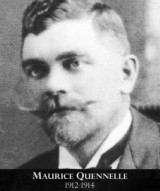
Maurice Quennelle was originally from Armentières, France. He immigrated to Canada in 1892 and settled in Wauchope, Saskatchewan. He earned his living as a farmer and merchant.
In February 1912, he became president of what would become the ACFC at the organization’s founding convention. His term was marked by the very first Congress of the French Language, held in Quebec City in June 1912. Under his presidency, the ACFC established the first local circles throughout the Francophone settlement centres. It also ensured that these local circles were present in all four corners of the province.
The organization’s final name, the Association Catholique franco-canadienne de la Saskatchewan, was also adopted during the first year of his term.
Joseph Eldège Morrier
President (held two terms)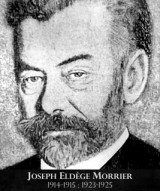
1914-1915 / 1923-1925
Joseph Eldège Morrier was originally from Montreal. A land surveyor by profession, he settled in Prince Albert, where he became involved in the written press, education and the French language. He was part of the teams that produced the Patriote de l’Ouest in Saskatchewan.
He was president of the ACFC twice, then head of the provincial secretariat from 1925 to 1928. During his first term in 1917, the ACFC established an interprovincial association called the Interprovinciale. This association was dedicated to recruiting French-speaking teachers in the prairies. During his second term, he prepared the ground for establishing a French-language teaching program implemented in public and separate schools attended by French speakers starting in 1925.
Arsène Godin
President
1915 - 1921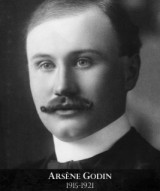
Arsène Godin was born in Acadia, Quebec, and settled in Willow Bunch in 1907. He graduated in medicine from the University of Montréal and studied medicine in Paris and New York. He was a member of the School of Medicine at the University of Saskatchewan in Saskatoon. Dr. Godin was the founder and first director of the Pasteur Hospital in Willow Bunch.
He became president of the ACFC in 1915. During his term, he sat on several working committees, including the one responsible for organizing the joint congress of the ACFC and the Association des commissaires d’école franco-canadiens (ACEFC) in 1921 in Willow Bunch. His mandate will be shaken by a significant linguistic crisis which will limit the teaching of French in Saskatchewan schools, the establishment of the Interprovincial and the creation of the Association of French-Canadian School Commissioners of Saskatchewan on which he will also sit.
Émile Gravel
President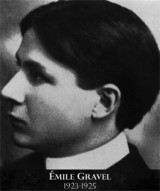
1921 - 1923
Émile Gravel was born in Victoriaville, Quebec. He settled in Gravelbourg, where he opened his law practice. He was active in several organizations related to education and the defence of the French language, including the Saskatchewan School Trustees Association (SSTA), the Cercle local de l’ACFC, and the Association des commissaires d’école franco-canadiens. He campaigned for more hours of French instruction in Saskatchewan elementary schools at an SSTA convention in 1917.
He became president of the ACFC in 1921. His term was marked by the deployment of political efforts to counteract the linguistic crisis that had led to the almost total abolition of French language instruction in the province.
Raymond Denis
Président
1925 - 1935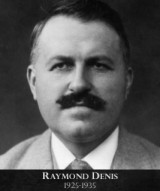
Raymond Denis was originally from Charente-Maritime, France, but he moved to St. Denis, Saskatchewan, at the age of 18.
He became president of the ACFC in 1925. His term was marked by the rise of anti-francophone sentiment among the conservative right, which dominated the 1929 election campaign. The elected Anderson government eliminated the elementary French program, leaving only one hour of French per day. The government also stopped recognizing Quebec teaching certificates, which prevented recruiting French-speaking teachers. Raymond Denis presided over the provincial rollout of the French-language teaching program, better known as the “ACFC course,” to counteract this policy.
He led the establishment of four private French-language radio stations in the Prairie provinces, including organizing several annual fundraising campaigns to finance their construction.
Maurice Baudoux
Président
1935 - 1936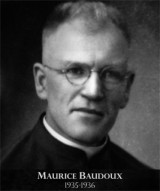
Father Maurice Baudoux was originally from La Louvière, Belgium, and settled in Prud’homme in 1911, where he became the parish priest of Saint Donatien and Rogatien. He would later become bishop of the Diocese of Saint Paul, Alberta, and then archbishop of the Diocese of Saint-Boniface. In 1941, at the Prud’homme presbytery, a meeting of representatives of French Canadians in the West launched a campaign that would lead, ten years later, to the establishment of the four French stations in the Prairies. He is remembered as the “father of French radio in the West.”
He was active in the ACFC for over 20 years. His short term as president of the ACFC was marked by the economic crisis that limited the organization’s ability to assemble. Maurice Baudoux was also very involved in the cooperative movement in 1947, when the cooperative movement was growing in Saskatchewan. He became a member of the first board of directors of the Canadian Council for Cooperation, Saskatchewan section.
Laurent Roy
Président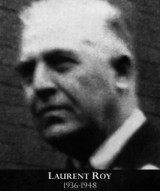
1936 - 1948
Laurent Roy, a proud Montreal native, made his way to Regina in 1913 after finishing his medical studies at Université Laval and honing his skills in the beautiful city of Paris.
He was first vice-president of the ACFC, then president for 12 years. This was the most extended term as president of the ACFC. The Second World War marked his term, as the financial crisis and the drought devastated the rural population, which was forced to move to survive. Dr. Roy maintained the efforts that led to the opening of four French radio stations in the West. Under his presidency, the ACFC supported efforts to provide bilingual postal services using both official languages on postal stamps and Canadian currency.
Louis Demay
Président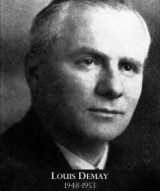
1948 - 1953
Born in Bordeaux, Louis Demay arrived in Canada in 1906. He ended up settling in Saint Brieux in 1912, where he had a homestead and a general store and became interested in municipal and school politics. He was a school trustee for many years. He was active in the Association of French-Canadian School Commissioners of Saskatchewan and in the ACFC, where he held several positions on the executive board.
As president of the ACFC since 1948, Louis Demay engaged in the final fight to obtain broadcasting permits for the 4 French radio stations in the West. He appeared before the federal agencies, putting all his energy into it. The ACFC would eventually obtain the necessary authorizations to open the last two stations in Gravelbourg and Saskatoon.
Louis Demay would be an agent of progress for his adopted village, Saint Brieux, where he played a decisive role in school construction projects, the construction of the church, the construction of the convent and the establishment of commemorative monuments marking the region.
Dumont Lepage
Président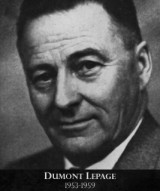
1953 - 1959
Dumont Lepage was originally from Gaspésie, Quebec, but his family settled in Vonda in 1909. He graduated from Collège de Saint-Boniface and studied commerce in Prince Albert. He was involved in several francophone organizations, including Radio-Ouest française, where he was appointed secretary. In 1951, he held the position of general administrator of the CFNS and CFRG radio stations while awaiting their operating licenses. Dumont Lepage was known for his support of French education and the development of French radio in Saskatchewan.
In 1953, he became president of the ACFC. During his term, the Association franco-catholique des institutions de la Saskatchewan (AFCIS) was created, which brought together francophone teachers in the province. This professional association within the ACFC aimed to improve teaching techniques in ACFC programs.
Maurice Denis
President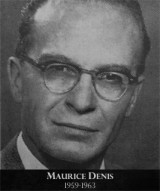
1959 - 1963
Maurice Denis was born in Saint-Denis, Saskatchewan. He attended Collège Mathieu in Gravelbourg and received a Bachelor of Laws from the University of Saskatchewan in Saskatoon. He then practiced law in the Carrot River and Zenon Park areas.
He was elected president of the ACFC in 1959, the first person elected president to be a native of Saskatchewan. His term was marked by the beginning of the Quiet Revolution in the province of Quebec, which, during the 1960s, redefined French-Canadian identity across the country and led to the provincial identities of Francophones that we know today across Canada. Under his presidency, the ACFC celebrated its Golden Jubilee and transferred the provincial secretariat from Vonda to Saskatoon.
Allyre Sirois
President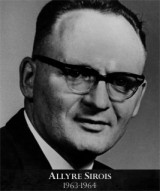
1963 - 1964
Allyre Sirois was born in Vonda, Saskatchewan. He joined the army in 1941 and then joined the intelligence services in 1943. He was a life member of the Canadian Legion and the Knights of Columbus. After the war, he attended the Faculty of Law at the University of Saskatchewan in Saskatoon and was called to the Saskatchewan Bar in 1951. He practised law in Gravelbourg and was appointed a judge of the Court of Queen’s Bench, where he served for 34 years. He was also the first judge to preside over a trial in the French language in Saskatchewan.
In 1963, Allyre Sirois became president of the ACFC. His term was marked by the rise of the Quiet Revolution in Quebec, the start of work on Vatican II, and the gradual secularization of the ACFC. The ACFC is also launching a volunteer training program aimed at developing lay leadership in the Vonda, Prud’homme, and St. Denis regions.
Roland Pinsoneault
President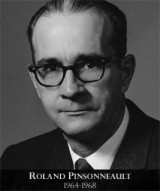
1964 - 1968
Roland Pinsonneault was born in St-Cyprien de Napierville, Quebec. He grew up in Gravelbourg and graduated from Collège Mathieu in that city. In 1942, he became active in the local ACFC circle in Gravelbourg. He campaigned in several sectors, including post-secondary education, print media, electronic media and culture.
In 1964, he was elected president of the ACFC, which became the Association culturelle franco-canadienne de la Saskatchewan. The provincial secretariat moved from Saskatoon to Regina to be closer to the seat of government and the Legislative Building. His term was marked by the amendment of the Education Act, allowing for instruction in French and opening the door to the eventual implementation of French immersion programs in the province. The ACFC appeared before the Royal Commission on Bilingualism and Biculturalism and filed a brief.
Roger Lalonde
Président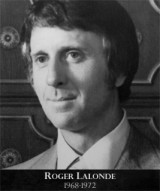
1968 - 1972
Originally from Assiniboia, Saskatchewan, Roger Lalonde completed his secondary and post-secondary studies in Regina, obtaining a Bachelor of Commerce and Economics in 1954. An entrepreneur, he founded his own insurance company in the hamlet of St. Victor, south of the province. He became involved in francophone politics to ensure his children received a French-language education.
He was elected President of the ACFC in 1968. His term was marked by the publication of the third and final volume of the Report of the Royal Commission on Bilingualism and Biculturalism, the adoption of the Official Languages Act of Canada, the establishment of the first French immersion school in Saskatoon, Saskatoon French School, and the creation of the newspaper L’Eau vive, distributed to ACFC members.
Joseph Jeanneau
Président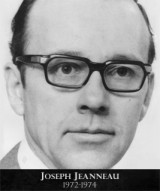
1972 - 1974
Joseph Jeanneau was born in Peterson, Saskatchewan, but grew up in Prud’homme. He pursued his post-secondary studies in philosophy at the Faculté Saint-Jean in Edmonton. He later obtained a bachelor’s degree in agricultural economics and a master’s degree in economics from the University of Manitoba in Winnipeg. He then pursued a career in the Canadian public service and spent a significant part of his life in Prince Albert.
Joseph Jeanneau was elected president of the ACFC in 1972. His term was marked by his interest in the economy, including an increase in the number of employees and a significant increase in the ACFC’s operating budget. During his term, the ACFC strengthened its social animation program, a program dedicated to developing volunteerism and the ability to influence one’s community. Joseph Jeanneau encouraged and supported the participation of Francophone youth in community affairs.
Albert Dubé
Président (deux mandats)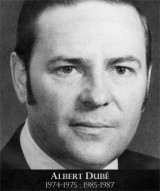
1974 - 1975; 1985 - 1987
Albert Dubé was born in Duck Lake, Saskatchewan. He studied at Stobart School in Duck Lake and then at Collège Saint-Jean in Edmonton. He graduated in environmental hygiene from the Canadian Institute of Public Health Inspectors. He then had a career in the provincial public service in Regina. He became the founding president of the Regina Local Circle of the ACFC.
He was first elected president of the ACFC in 1974. His term was marked by the transfer of the newspaper L’Eau Vive from St. Victor to Regina and the founding of Les Publications fransaskoises ltée. Albert Dubé advocated the construction of local community cultural centers, providing ownership of community infrastructure.
Clotaire Denis
President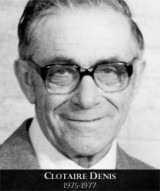
1975 - 1977
Clotaire Denis was originally from St. Denis, Saskatchewan. A farmer, he campaigned for more French in the province’s schools.
He was elected president of the ACFC in 1975, a turbulent period for the Canadian Francophonie in general. Several new groups were created in Saskatchewan, such as the Association Jeunesse Fransaskoise (AJF) and the Société Historique de la Saskatchewan (SHS). During his term, Clotaire Denis oversaw the development of the “Ready” report on the future of Collège Mathieu. He also campaigned with the Ministry of Education to obtain an office from the provincial government responsible for French-language programs and enriched immersion schools. On the national level, the ACFC participated in the founding of the Fédération des francophones hors Québec, today called the Fédération des communautés francophones et acadiennes du Canada (FCFA).
Irene Chabot
President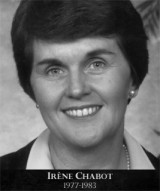
1977 - 1983
IIrène Fournier-Chabot was born in Montreal, Quebec, but grew up in Ferland, Saskatchewan. Between 1973 and 1977, she served on the ACFC's board of directors, concerned about French's status as an official language in Saskatchewan.
In 1977, she was elected president of the ACFC, the first woman to hold this position in the organization's history. Her term was marked by the famous “Mercure case.” The ACFC followed the case closely since it was heard in the provincial court. Irène Fournier-Chabot chaired the association during a political turmoil related to the Quebec referendum on sovereignty-association, the repatriation of the Canadian constitution, and the creation of the Canadian Charter of Rights and Freedoms.
Liguori Leblanc
President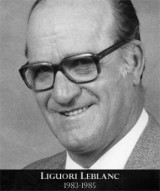
1983 - 1985
Liguori LeBlanc was born in Sainte-Rose-du-Dégelis, Quebec. He moved to Saint-Denis, Saskatchewan, at a very young age. At 17, he was elected secretary of the Saint-Denis school organization, attracted by municipal politics, particularly school issues.
When he was elected president of the ACFC in 1983, the rights of the official language minority in education were the topic of the day throughout the Canadian Francophonie. Indeed, section 23 of the Canadian Charter of Rights and Freedoms had just been added. Father Mercure legally ceded his cause to the ACFC in Saskatchewan for health reasons. Liguori LeBlanc’s term was also marked by the establishment of a new Radio-Canada broadcasting centre in Regina. It was also the beginning of major rural community centre projects in Debden and St. Isidore-de-Bellevue. This is consistent with the study of the potential of school-community centres in the province.
Rupert Baudais
Président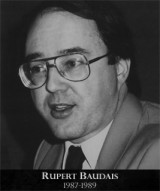
1987 - 1989
Rupert Baudais was born in St. Isidore-de-Bellevue, Saskatchewan. He earned a law degree from the Faculty of Law in Saskatoon and a Master of Arts from the University of Regina. A lawyer in Prince Albert and then in Regina, he practised law in French before the provincial courts.
Rupert Baudais was elected president of the ACFC in 1987. The Fransaskois community suffered a significant setback when the Saskatchewan Language Act of 1988 received royal assent and made Saskatchewan a unilingual English province. Under Rupert Baudais’s presidency, the ACFC negotiated several agreements with the federal government to compensate for the effects of this law. In particular, he signed the first Canada-community agreement with the Secretary of State of Canada to ensure the development of the Fransaskois community. His mandate was marked by the creation of several provincial organizations: the Saskatchewan Artists Association, the Provincial Federation of Fransaskoises and the Association of French-Speaking Jurists of Saskatchewan.
SUZANNE BUGEAULT
President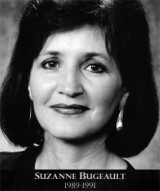
1989 - 1991
Suzanne Bugeaud, originally from Alberta, holds a Bachelor of Arts and Law from the University of Edmonton. After settling in Regina, she practiced law for several years and became involved in the Fransaskois parents’ movement.
Amid the struggle for francophone school governance in Saskatchewan, she was elected president of the ACFC at the first Rendez-vous fransaskois in 1989. Under her presidency, the ACFC made numerous appearances before parliamentary committees, commissions of inquiry and several federal and provincial agencies to defend the Fransaskois community in the Meech Lake debate on constitutional reform and the resulting crisis. Her mandate was marked by implementing a new development strategy for the Fransaskois community, which resulted from the signing of the first Canada-Community Agreement in 1988. This strategy is provided for regional management by local organizations, which benefit from funding intended explicitly for the regions.
DENIS MAGNAN
President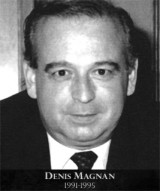
1991 - 1995
Denis Magnan is originally from Alberta. He has degrees in education and psychology but has pursued a career focused on entrepreneurship and business. He moved to Regina in the mid-1980s to work for the Saskatchewan Workers’ Compensation Board.
Elected president of the ACFC in 1991, Denis Magnan was interested in political debates and advocating for the Fransaskois community to governments. He renegotiated a second Canada-community agreement with the Department of Canadian Heritage. His term was marked by the constitutional debate and the 1992 referendum on the Charlottetown Accord. He also worked on developing a viable consultation structure for the community network.
MICHEL VÉZINA
President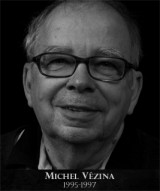
1995 - 1997
Originally from the province of Quebec, Michel Vézina is a trained teacher. He settled in Zenon Park in the 1970s. He then worked as a community development officer at the ACFC and began a career at Collège Mathieu in Gravelbourg. He directed the Le Lien resource centre, the Francophone adult education service, and the Collège Mathieu.
He was elected president of the ACFC in 1995, in the context of a funding crisis for non-profit organizations. His term began with the publication of the Schneider Report in December 1995 on the state of public funding for Francophone organizations in Saskatchewan. This report announced significant cuts in funding from the federal government. His presidency saw the holding of the Estates General of the Fransaskoise community, which resulted in the development of a new governance structure for the Fransaskoise community.
LORRAINE ARCHAMBAULT
President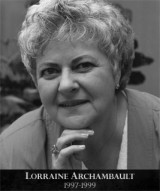
1997 - 1999
Originally from Gravelbourg, Lorraine Archambault is fiercely interested in the Francophonie and French culture. As a young adult, she became a host on CFRG radio. After several years of involvement in early childhood in Prince Albert, where she settled with her family, she devoted herself to music, theatre and choral singing.
Lorraine Archambault was elected president of the ACFC in 1997. Her term was marked by creating the Fond fransaskois, the precursor to the Fondation fransaskoise aimed at greater financial autonomy for Francophone organizations. A persistent funding crisis marked her term for Francophone organizations. The États généraux de la communauté fransaskoise, a series of major meetings linked to the États généraux, occupied a large part of her term. She presided over the reform of the bylaws and regulations of the ACFC and the renewal of the governance structure of the Fransaskois community and the ACFC itself, which was renamed the Assemblée communautaire fransaskoise (ACF) in June 1999.
GILLES GROLEAU
Président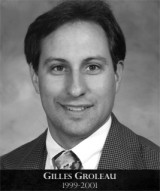
1999 - 2001
Gilles Groleau is originally from Trois-Rivières, Quebec. He continued his career in the field of education in Saskatchewan. He was successively a teacher, school principal, school administrator and consultant to the Ministry of Education.
Gilles Groleau was elected president of the ACF in 1999 as part of the first general election of the new governance structure resulting from the Estates General of the Fransaskoise community. With this new structure, all French speakers in Saskatchewan could vote to elect their representatives. Gilles Groleau was then tasked with making the ACF known and strengthening community cohesion after several years of debates about the governance of the community. Under his presidency, the ACF took charge of the Francophone employability file in Saskatchewan and sought to define its role as the governing body for the community. The negotiations between the ACF and the University of Regina concerning the Institut français marked his mandate. These steps begin a period of very close proximity between the French Institute and the Fransaskois community.
JENNIE BAUDAIS
President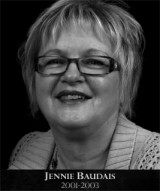
2001 - 2003
Originally from St. Isidore-de-Bellevue, Saskatchewan, Jennie Baudais is a businesswoman active at the local level with the Fransaskoise school and the Association Francophone BDS. She was notably involved in constructing the Rendez-vous, the Fransaskois cultural centre in Bellevue.
First, she was a community representative and became president of the ACF in 2001. The ACF then focused on fully fulfilling its mandate by asserting its accountability in funding the programming of all the organizations in the network. Jennie Baudais’ presidency was marked by the exploration of establishing a community radio network, funding by Industry Canada and implementing the high-speed wireless Internet network “Baudoux communications” and funding by Health Canada for the French-language health sector in Saskatchewan.
WILFRID DENIS
Président (par intérim)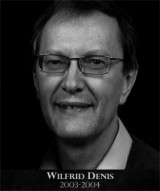
2003 - 2004
Originally from St. Denis, Saskatchewan, Wilfrid Denis holds a doctorate in sociology and has a career as a professor at the University of Saskatchewan in Saskatoon. Interested in the development of the Fransaskois community, he focuses his research on the rights of linguistic minorities in Canada. Wilfrid Denis is mainly involved in the Fransaskois community through research and the writing of reports and analytical studies.
As vice-president of the ACF and community MNA for Saskatoon, he was called upon to take over the presidency when Jeannie Baudais resigned, who then entered provincial politics. Wilfrid Denis served as interim president of the ACF until the 2003 election. His term was marked by an exploratory mission on the treatment of linguistic minorities elsewhere in the world. Wilfrid Denis chairs the work of the Commission on Inclusion in the Fransaskois community and ensures the participation of the university community in this process.
MARIE-FRANCE KENNY
Présidente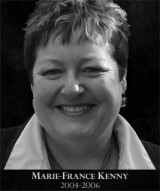
2004 - 2006
Originally from Montreal, Marie-France Kenny settled in Saskatchewan after spending several years in New Brunswick. She is a trained translator and a businesswoman. She is involved in the Francophone community of Regina, as president of the Association canadienne-française de Regina (ACFR), then of the Coopérative des publications fransaskoises.
Marie-France Kenny was elected president of the ACF in 2004. Her term was marked by establishing the Commission on Inclusion in the Fransaskoise Community, the French Health Network, the creation of the Coalition for the Promotion of the French Language in Saskatchewan and the rapid progress of the Francophone immigration file. In 2009, Marie-France became president of the Fédération des communautés francophones et acadiennes du Canada (FCFA).
MICHEL DUBÉ
President
2006 - 2010
Michel Dubé was born in Duck Lake, Saskatchewan. His father, Albert Dubé, was president of the ACFC in the 1970s and 1980s. Michel Dubé attended Collège Mathieu in Gravelbourg and earned a bachelor’s degree from the University of Regina. He began as a journalist at Radio-Canada before joining the ACF team, where he held several positions, including community development officer and education sector manager. In the early 1990s, Michel Dubé headed the Comité de la mise en œuvre de la gestion scolaire fransaskoise.
Elected community representative for Prince Albert in 1999, he was elected president of the ACF in 2006. His term was marked by the promotion of the “Terroir fransaskois” concept, the launch of the “Bonjour Saskatchewan” promotional campaign, the first “Francofièvre” shows, and the Franco-Métis Round Tables project carried out in partnership with the Institut français at the University of Regina. This project resulted in the signing of a solidarity pact between the Métis Nation-Saskatchewan and the ACF.
PAUL F HEPPELLE
Président 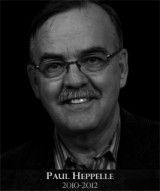
2010 - 2012
Paul Heppelle is originally from Ontario but grew up in Saskatchewan, where he attended Collège Mathieu in Gravelbourg. An educator by training, he was the principal of the province’s first French immersion school: Saskatoon French School. He then taught at Collège Mathieu and became its principal in the late 1970s. In 1990, Paul Heppelle was appointed Director of the Francophone Affairs Branch of the Saskatchewan government. He was officially the first principal.
In 2010, he was elected President of the ACF after two terms as elected representative for Regina. His term was marked by a significant increase in Francophone immigration to the province and the establishment of welcoming structures in French for newcomers coming to Saskatchewan. Under his presidency, an international recruitment agreement was signed with the government of Mauritius. These efforts led, among other things, to the proclamation of 2012 as the “Year of the Fransaskois” by the provincial government and the signing of a Solidarity Pacte with Métis Nation Saskatchewan.
FRANÇOISE SIGUR-CLOUTIER
Présidente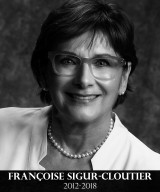
2012 - 2018
Françoise Sigur-Cloutier, originally from Toulouse, France, immigrated to Canada in 1967 and raised her family in Calgary. Her integration into Canadian society was through volunteer work, and she began her career in community development in that city. She settled in Gravelbourg in 1990 when she became the first general manager of the Fédération provinciale des Fransaskoises. Her career continued as Regional Communications Manager for Radio-Canada Saskatchewan from 1994 to 2012.
Elected president of the ACF in November 2012, Françoise Sigur-Cloutier focused her mandate on political representation and the promotion of the community. She works on essential issues for the development of the community: post-secondary education and immigration. Her mandate was marked, among other things, by the creation of the Cité universitaire francophone at the University of Regina and the decision by the Supreme Court of Canada in the Caron-Boutet case in 2015, where the ACF intervened to demand the official status of French in Saskatchewan and Alberta.
ROGER GAUTHIER
Président
2018
Originally from Quebec, Roger Gauthier arrived in Saskatchewan to work as a radio producer at CBKF, the Radio-Canada station in Saskatchewan. He then devoted himself to community development in the Fransaskois community. He headed several organizations, including the Association culturelle franco-candienne de la SK (ACFC), the Association des parents fransaskois (APF) and the Réseau santé en français de la Saskatchewan (RSFS).
He was sworn in as president of the ACF in February 2018, when the 2018-2022 Action Plan for Official Languages was implemented. His term was marked by increased participation of the ACF,s elected officials. His presidency ended on July 3, 2018, following a decision by the Saskatchewan Court of Queen’s Bench du to the election being challenged in the courts. This decision resulted from legal action against the ACF and reversed the result of the 2017 general election. Roger Gauthier, however, continues his community involvement as a volunteer on the boards of directors of the Troupe du Jour, the Fondation fransaskoise and Collège Mathieu.
Denis Simard
Président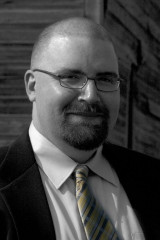
2018 - présent
DDenis Simard grew up in Calgary, Alberta, before settling in Gravelbourg as a child. He completed his secondary studies at Collège Mathieu. After a term as president of the Association jeunesse fransaskoise (AJF), he became director of the Conseil jeunesse francophone de la Colombie-Britannique (CJFCB). Returning to Saskatchewan as executive director of the AJF, he orchestrated the revival of the Fête fransaskoise. He advocated for the inclusion of immersion students in the activities of the Fransaskoise community.
Elected president of the ACF in 2018, his term was marked by pan-Canadian efforts to modernize the Official Languages Act in Canada. His presidency saw the establishment of the Service d’accueil et d’inclusion francophone (SAIF-SK), a major development in the French postsecondary education sector in Saskatchewan and the launch of the “Mieux vivre ensemble” project. His leadership enabled the ACF to renew its electoral process, adopt new governance policies and modernize its bylaws.
